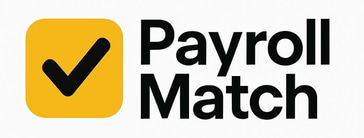Navigating the AI Hype: What SMBs Need to Know About Machine Learning HR Trends
In the fast-paced world of human capital management (HCM), small and medium-sized businesses (SMBs) are facing an AI-driven transformation that's changing the landscape of HR departments everywhere. But what does this mean for small business owners juggling multiple roles? With machine learning HR trends on the rise, it's crucial to understand how these innovations can relieve manual HR burdens while also being wary of potential over-promises.
Payroll Match
5/2/20254 min read


In the fast-paced world of human capital management (HCM), small and medium-sized businesses (SMBs) are facing an AI-driven transformation that's changing the landscape of HR departments everywhere. As major HCM providers like Gusto, Rippling, and Paychex ramp up their investments in AI payroll automation, these technological advancements promise to simplify processes from automated payroll corrections to compliance tracking. But what does this mean for small business owners juggling multiple roles? With machine learning HR trends on the rise, it's crucial to understand how these innovations can relieve manual HR burdens while also being wary of potential over-promises. Join us as we explore real-world stories and expert insights into how these tools are reshaping HR, and discover how to navigate the hype with a clear, informed perspective.
AI Rollouts from Leading Vendors
The landscape of HR technology is rapidly evolving, with major players in the SMB space leading the charge. Let's explore the latest innovations from industry giants and how they're reshaping compliance solutions for small businesses.
Innovations from Gusto, Rippling, Paychex
Gusto, Rippling, and Paychex are at the forefront of AI payroll automation, each bringing unique offerings to the table. These HCM providers are leveraging machine learning to streamline HR processes and reduce manual overhead for SMBs.
Gusto has introduced an AI-powered payroll assistant that can predict and correct errors before they occur, saving valuable time for small business owners. This smart system learns from historical data to improve accuracy over time.
Rippling, on the other hand, has developed an integrated platform that uses AI to manage everything from onboarding to offboarding. Their system can automatically update compliance requirements across multiple states, a game-changer for businesses with remote workers.
Paychex has focused on enhancing their compliance tracking capabilities, using machine learning algorithms to monitor regulatory changes and alert businesses to potential issues before they become problems.
Transformative SMB Compliance Solutions
SMB compliance has traditionally been a complex and time-consuming aspect of business management. However, AI-driven solutions are transforming this landscape, making it more accessible and manageable for small businesses.
These new tools use natural language processing to interpret complex legal jargon and translate it into actionable steps for businesses. This means SMB owners can stay compliant without needing to be legal experts themselves.
AI-powered compliance tracking systems can now monitor changes in regulations across multiple jurisdictions in real-time. This is particularly valuable for businesses operating in multiple states or countries.
Moreover, these systems can generate customized reports and alerts, ensuring that businesses are always aware of their compliance status and any necessary actions. This proactive approach helps prevent costly penalties and legal issues.
Industry Insights on AI Trends
As AI continues to reshape the HR landscape, industry experts and tech insiders offer valuable perspectives on current trends and future possibilities. Let's dive into their predictions and concerns.
Analysts' Predictions and Skepticism
Industry analysts are closely watching the rapid development of AI in HR technology, offering both optimistic predictions and cautionary notes. Their insights provide a balanced view of the potential and pitfalls of these new technologies.
According to a recent Deloitte report, by 2025, AI is expected to automate up to 30% of HR tasks in SMBs. This could lead to significant cost savings and improved efficiency for small businesses.
However, some analysts express skepticism about the over-promising of AI capabilities. They caution that while AI can greatly enhance HR processes, it's not a magic solution that can replace human judgment entirely.
There's also concern about data privacy and security as AI systems handle increasingly sensitive employee information. Analysts stress the importance of robust safeguards and transparent AI decision-making processes.
Tech Insiders' Views on Machine Learning HR
Tech insiders working on the frontlines of AI development offer unique perspectives on the future of machine learning in HR. Their insights shed light on both the exciting possibilities and the challenges ahead.
Many insiders believe that the next frontier for machine learning HR will be predictive analytics. AI systems could potentially forecast hiring needs, identify flight risks among employees, and even predict team dynamics.
However, they also acknowledge the challenges in developing truly unbiased AI systems. Ensuring that machine learning algorithms don't perpetuate existing biases in hiring and promotion decisions remains a key focus area.
Some tech insiders are exploring the potential of explainable AI in HR, which could help build trust by making AI decision-making processes more transparent to both employers and employees.
Real-World Impact on Small Businesses
The true test of any technology lies in its real-world application. Let's examine how AI and machine learning are actually affecting small businesses in their day-to-day operations.
Success Stories in Automated Payroll Corrections
Automated payroll corrections have emerged as a game-changer for many small businesses, saving time and reducing errors. These AI-driven systems are transforming how SMBs handle one of their most crucial and complex tasks.
One success story comes from a small retail chain that implemented an AI payroll system. The business saw a 40% reduction in payroll processing time and nearly eliminated manual errors, allowing the owner to focus more on strategic growth.
Another example is a tech startup that used AI to manage complex pay structures for their global remote team. The system automatically adjusted for different tax jurisdictions and time zones, ensuring accurate and timely payments.
A restaurant group reported that their AI payroll system caught and corrected over 200 potential errors in a single quarter, saving them from potential compliance issues and employee dissatisfaction.
Challenges and Considerations in Compliance Tracking
While AI-powered compliance tracking offers significant benefits, it also comes with its own set of challenges and considerations that SMBs need to navigate carefully.
One major challenge is the initial setup and integration of these systems. Small businesses often lack the technical expertise to implement complex AI solutions, leading to a steep learning curve.
Data privacy concerns also loom large. As AI systems process sensitive employee and financial data, ensuring robust security measures becomes paramount. SMBs must carefully vet their AI providers and understand how their data is being used and protected.
There's also the risk of over-reliance on AI systems. While these tools can greatly assist in compliance tracking, they shouldn't replace human oversight entirely. Businesses need to strike a balance between leveraging AI capabilities and maintaining human judgment in critical decisions.
Lastly, as regulations evolve, AI systems need regular updates to stay current. SMBs must factor in the ongoing costs and effort required to keep their compliance tracking systems up-to-date and effective.
Support
Experience
team@payrollmatch.io
(585) 708-7573
© 2025. All rights reserved.
Privacy Policy - https://payrollmatch.io/privacy-policy
Terms and Conditions - https://payrollmatch.io/terms-and-conditions
